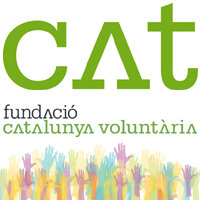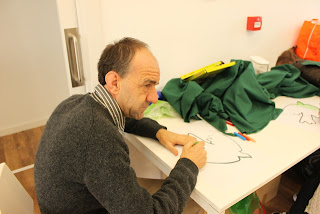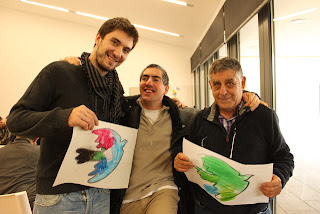 70 online volunteers have contributed extensively, during several months, to the Peace Bag for Euromed Youth toolkit drafting, reviewing and translating the 191 page publication into 12 languages, as well as creating the layout and a web version. The Peace Bag, which offers practical tools to promote a culture of peace at the local and regional level across the Mediterranean, has been developed in a participatory process that involved 18 youth-led and youth-serving organizations from 14 countries in the region, coordinated by the Fundació Catalunya Voluntària.
70 online volunteers have contributed extensively, during several months, to the Peace Bag for Euromed Youth toolkit drafting, reviewing and translating the 191 page publication into 12 languages, as well as creating the layout and a web version. The Peace Bag, which offers practical tools to promote a culture of peace at the local and regional level across the Mediterranean, has been developed in a participatory process that involved 18 youth-led and youth-serving organizations from 14 countries in the region, coordinated by the Fundació Catalunya Voluntària.“All the work, effort and the dedication of these volunteers have resulted in a very powerful publication that seeks to transform society by educating young people about how peace is related to their everyday lives,” says Meghann Villanueva, project coordinator from Fundació Catalunya Voluntària." This is an extraordinary team who went beyond what they were asked to do. Their strong sense of initiative was what mattered most, and this was what made our toolkit extraordinary.”
While the toolkit will be distributed among organizations as well as public and private institutions from all the participating countries, for Fundació Catalunya Voluntària the impact of the collaboration starts with the volunteers, whose interest in intercultural dialogue and peace-building increased through this collaboration. “This project provided them with an intercultural platform to learn about different cultures, countries and people – which is the very content of the toolkit. According to our volunteers´ feedback, they learned a lot during the work process, and for us, this is an impact that has no price. Many of the volunteers are interested to collaborate further in our project,” says Meghann Villanueva.
Gayatri Navaratnam, born in Nigeria and living in the United Kingdom, confirms that she has learned a lot about “how peace must be transformed from an abstract to an active and immediate part of our daily lives if it is to really impact any part of the world,” and she recommends others to involve themselves in online volunteering “as it provides a medium to practice intercultural dialogue, an essential aspect of fostering global communal ties.” And Dina M. Mansour from Egypt states: “I was amazed by how many Euromed foundations cooperate with each other to build peace and bring minds and people together. I felt I was a part of something huge and didn't mind how many hours I spent reading, analyzing and translating.”
































